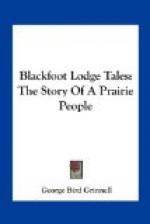In later times once, Na’pi said, “Here I will mark you off a piece of ground,” and he did so.[1] Then he said: “There is your land, and it is full of all kinds of animals, and many things grow in this land. Let no other people come into it. This is for you five tribes (Blackfeet, Bloods, Piegans, Gros Ventres, Sarcees). When people come to cross the line, take your bows and arrows, your lances and your battle axes, and give them battle and keep them out. If they gain a footing, trouble will come to you.”
[Footnote 1: The boundaries of this land are given as running east from a point in the summit of the Rocky Mountains west of Fort Edmonton, taking in the country to the east and south, including the Porcupine Hills, Cypress Mountains, and Little Rocky Mountains, down to the mouth of the Yellowstone on the Missouri; then west to the head of the Yellowstone, and across the Rocky Mountains to the Beaverhead; thence to the summit of the Rocky Mountains and north along them to the starting-point.]
Our forefathers gave battle to all people who came to cross these lines, and kept them out. Of late years we have let our friends, the white people, come in, and you know the result. We, his children, have failed to obey his laws.
THE DOG AND THE STICK
This happened long ago. In those days the people were hungry. No buffalo nor antelope were seen on the prairie. The deer and the elk trails were covered with grass and leaves; not even a rabbit could be found in the brush. Then the people prayed, saying: “Oh, Old Man, help us now, or we shall die. The buffalo and deer are gone. Uselessly we kindle the morning fires; useless are our arrows; our knives stick fast in the sheaths.”
Then Old Man started out to find the game, and he took with him a young man, the son of a chief. For many days they travelled the prairies and ate nothing but berries and roots. One day they climbed a high ridge, and when they had reached the top, they saw, far off by a stream, a single lodge.
“What kind of a person can it be,” said the young man, “who camps there all alone, far from friends?”
“That,” said Old Man, “is the one who has hidden all the buffalo and deer from the people. He has a wife and a little son.”
Then they went close to the lodge, and Old Man changed himself into a little dog, and he said, “That is I.” Then the young man changed himself into a root-digger,[1] and he said, “That is I.”
[Footnote 1: A carved and painted stick about three feet long, shaped like a sacking needle, used by women to unearth roots.]
Now the little boy, playing about, found the dog, and he carried it to his father, saying, “Look! See what a pretty little dog I have found.” “Throw it away,” said his father; “it is not a dog.” And the little boy cried, but his father made him carry the dog away. Then the boy found the root-digger; and, again picking up the dog, he carried them both to the lodge, saying, “Look, mother! see the pretty root-digger I have found!”




